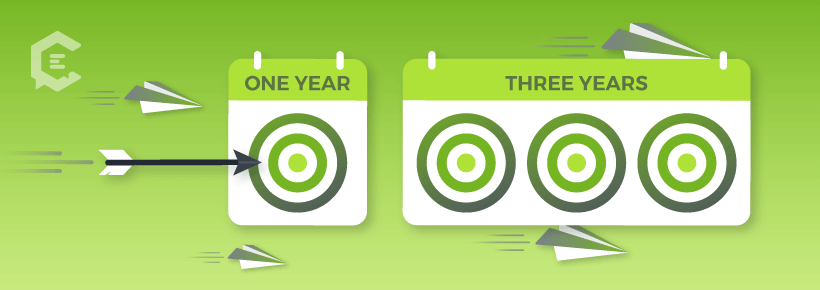As we look to a new decade, it’s time to reflect on the evolution of the gig economy and what these changes mean for freelancers. In part three, we look at the importance of setting long-term, measurable goals for your business.
Ask any freelancer on the moment they decided to ‘take the plunge’ — and they’ll definitely have a story to tell. For me, the final push out of my comfort zone was a huge decision and one that I look back at now, and wonder how I ever considered not becoming my own boss. Three years — and countless assignments and clients later — and I’ve figured out routines, processes and workflows that are effective for my personal way of doing business.
That being said… I’ve thought, ahem, very little about setting goals for myself. Or my company. And though I can keep track of all deliverables expected from me in the coming months, when I think about a year from now or even three, it’s tough to predict — or even dream! — of where my business could (or should) be.

Though the practice of creating goals is tried-and-true within every industry, somehow, it’s one of those tasks that fall low on the priority list once someone goes from full-time professional to full-time self-employed. As the gig economy continues to soar through, this soft skill becomes that much more vital to prolonged freelance careers.
As industrial-organizational psychology practitioner and workplace expert, Amy Cooper Hakim, Ph.D. explains, many solopreneurs believe they only need to consider goals when they’re growing their pipeline or when they’re tackling a huge project. But that’s far from the truth, since always having a pulse on where you’d like to go sets you up for productivity and a lengthy career:
Goals give us direction and move us forward. The most successful people set goals to help them to stay on track and to meet and exceed their plans and dreams. Goals lead us to set specific objectives by which we may measure our success.
5 Ways to set measurable, effective long-term goals for your business.
1. Set aspirations for one year and for three years.
As you already know since, hey, you’re a wordsmith, the definition of ‘long-term’ can mean one thing to one person, and another to someone else. In terms of goal-setting though, it’s recommended by experts to set markers for one year and for three years to get started. Hakim explains that being able to visualize what you’re working toward will help to inform the steps you take every day, week and month to get there.
She suggests following the ‘SMART’ tactic for identifying your goals: specific, measurable, attainable, realistic and timely. For example, if by the end of 2020, you want to snag three regular writing opportunities, you can set yourself up for success by practicing weekly habits that make it possible. These may include cold emailing, following up with past leads, creating a ‘sale’ to drum up business, and more.
When you’re thinking about three years from now, founder and CEO of The Lonely Entrepreneur, Michael Dermer, recommends being a bit loftier. When you think of where you were three years ago, and where you are now, likely, you’ll be surprised with just how much you’ve achieved. All too often, people believe the big-ticket dream can come true overnight, or even in three or six months.
In reality, it’s the daily grind over longer periods that actually makes a difference. “When you take this approach, you can then build a plan that has an adequate amount of time to take hold,” he continues.
One example may be an IT consultant who wants to learn a new language that’ll grow a part of his or her business. Giving themselves three years to check that box off is more realistic than one year. The same is true for a content marketer who wants to become SEO certified so they can offer keyword optimization to future clients. Take the time, and really hone the talent, rather than rushing through it.
2. Don’t forget about personal goals, either.
Part of what’s driving the gig economy is the desire to have a healthy work and life balance. Because professionals want to define their own hours, log deadlines from anywhere, and still have time to connect with loved ones, more and more are finding ways to becoming freelance.
That’s why solopreneurs shouldn’t discount the importance of personal goals either, since these are likely part of the force that led you to go out on your own.
As Hakim shares:
If you only focus on professional growth, you may lose out on the many benefits of this non-traditional role. Take time to determine where you want to be one year from now. You may want to start a new hobby or expand your social network.
Whatever the case, consider what is contributing to your overall lifestyle, and find ways to enrich and strengthen those parts of your everyday. Perhaps you want to take three months off following the birth of your child, or you want to work less during the summer so you can travel. These may not feel like typical goals but they are just as important to the solopreneur who values freedom.
3. Determine what contributes to your bottom line.
As a volatile industry that’s unpredictable, it definitely takes someone with a strong backbone to find comfort in the uncomfortable. But as freelance take off, so do the deadlines and expectations from clients. Dermer says many times, this can lead one-man-or-one-woman shows to feel as if they are constantly juggling priorities, with no end in sight.
This can lead to major burnout, mistakes and even some hiccups within their income. That’s why basing some of your goals on your bottom line can make a difference.
As the saying goes, time is money, and if you’re not constantly working on projects that add to your bank account, you’re wasting your brilliance.
As Dermer says:
Choosing the things that you want to focus on and setting a specific goal for that objective is essential to success. Without a goal, we are often rudderless, and don’t measure how we are doing in the midst of the chaos of the entrepreneurial day.
4. Focus on skill sets for tomorrow.
What works right now in the gig economy, may not be what works tomorrow. When developing your long-term goals, try to be one step ahead of your industry. What do you predict will be in demand, from writers, in one or three years? Dig into trends and talk to those you trust within your network. From there, you can determine where your focus is most needed.
And if you need to invest heavily in honing in on a new skill? Set up the time now to do so. This protects our current company — and our future pipeline.
Dermer notes:
It is incumbent on all of us to think of the things that can put us out of business. Is there a piece of technology that will replace or diminish our value or skills? Take a hard look at the trends that will shape your industry in the next three years and be on the right side of the trend. Once you identify the trend or market factor that can put you out of business, commit yourself to learning what you need to learn to be on the right side of that trend.
5. Limit your goals to three solid options.
After you brainstorm all of your hopes and dreams, you have a double-digit list of long-term goals. Go you! Now, put on that editing hat and narrow your aspirations down to three solid, worthwhile perspectives. Dermer says this process may be tedious, but it ensures we are focused and streamlined toward what we truly need to be happy and profitable:
There may be many things you want to do but you have to be thoughtful and realistic about what it takes to get them done. And in many cases it will require additional resources or capital to achieve these long-term goals. Pick your three — and only three — with purpose and set a real target and build a plan to give you the best chance of success.






